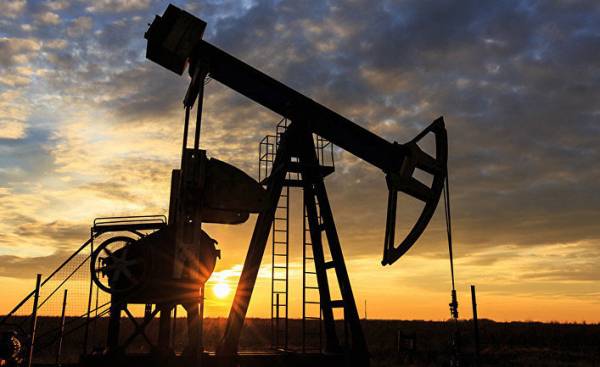
Oil reserves are today at historical highs, and price forecasts are a dime a dozen.
But they are very different from a 20 percent reduction (about 42 dollars per barrel) before a sharp increase to 100 percent (up to $ 100) by next year. It is unclear why market experts are so far apart in their estimates on the prices of any raw materials. Even more confusing the fact that energy prices have a disproportionate impact on the economy, especially in those countries which very much need fuel supplies. The lack of a precise understanding of the prospects of oil prices is not a new problem. The news is huge variety and inconsistencies of opinions and evaluations. The situation is exacerbated by the actions of the President of Donald trump and the chaotic, often extreme situation in which we find ourselves.
Undoubtedly, the demand and supply are the main elements in determining the price. According to the U.S. energy information, the volume of oil in the world account for 98.3 million barrels per day, but consumption a little less — 98,1 million barrels. With the pace of the oversupply will continue and prices should not be very hard to change. But that’s only if everything else is static. However, hope for this in any case impossible.
Production cuts. The organization of countries-exporters of oil (OPEC) and some excluded countries (primarily, Russia) from January, have cut production by about 1.8 million barrels a day. Thanks to these efforts, a little balanced supply and demand, the price of oil went up a few dollars (interestingly, even before quotas were introduced). The representatives of Saudi Arabia said that these measures can be maintained until the end of the year. A decision on this issue can be taken 25 may in Vienna.
Geopolitical problems. Geopolitics always plays a role in oil pricing, especially if it involves conflict, for example, in the Persian Gulf area, which produces approximately 60% of all oil in the world. We have seen this repeatedly. But today the situation is different.
When President trump launched 59 “Tomahawk” to destroy one runway in Syria, this exacerbated the already difficult situation in the middle East, and there was the additional risk of faults with deliveries of oil exports. This had a serious impact on Syrian exports, but Syria produces a total of 33 000 barrels per day (Poland, Peru and Papua New Guinea produce more). What is more important. Syria is allied with Russia (the world’s largest oil producer) and Iran. After the lifting of international sanctions, Iran has increased production at least two times to four and then to five million barrels a day. Russia alone or together with its allies can flood world markets with oil, which will lead to lower prices not only for her but for those who are on the other side of the Syrian conflict. First of all, it will affect Saudi Arabia and the U.S., which took second and third place in the world for oil production, respectively.
Will Russia, Iran and Syria to such measures if it goes against their economic interests? It’s hard to say. Think about it: economic sanctions imposed by the US and the UN against North Korea due to a program to develop nuclear weapons ravaged the country. The income per capita in Korea is only 1 800 dollars, and according to the UN, up to 84% of North Koreans suffer from malnutrition. But their 33-year-old leader Kim Jong UN calmly continues his insane policy of nuclear proliferation no matter what.
Conclusion: countries do not always act in their economic interests.
Problems of internal policy. In addition to geopolitical circumstances, there is a huge uncertainty about domestic economic plans of the President of the trump. Numerous presidential decrees indicate its intention to cancel environmental and energy laws and regulations. In addition, today, there are few who believe that he will fulfill all his political promises during the election campaign. The main slogan of trump during the race was “repeal and replace Obamacare”, but today these efforts fail. Many of us have tried to forget about it in the hope that the President and Congress move to address other political issues and activities will boost the economy. Tax reform and modernization of the infrastructure that need to be implemented in tandem (as I say a long time) would be a huge blessing and brought great benefits. But the President recently surprised his people, changing course and declaring that he wants to come back and deal with the repeal and replacement of Obamacare, and only then move on to other issues. But Republicans this week talking about the new plan. In an environment of such uncertainty, traders in financial and commodity markets began to ask questions about when President trump will fulfill his campaign promise once again to make America great, and whether this can happen.
While market participants generally agree with the President’s promises, hoping that it would not only reduce the burden of regulation, but also create incentives for the economy. Financial sector since the election have risen by 18%, mainly due to the fact that he believed the Trump. However, it should be noted that uncertainty is also leading to increased volumes of trading, be it stocks defense and energy companies, bonds, commodity futures or options. There is no doubt that the uncertainty here plays a role.
The new York Mercantile exchange (NYMEX), which is the main trading platform for oil and energy is going through a time of records, especially in the energy sector. The volume of contracts for West Texas intermediate oil (WTI) in the past month increased by 10 percent. One of these days, the number of traded contracts reached 2.2 million! Options WTI increased enormously — by 36% (224 000 transactions per day). Energy producers have raised their positions on an annual basis by about 40%. The fact that traders are speculating and are insured against risks in record numbers. Today, in conditions of increasing instability, healthy markets is an urgent necessity. We are fortunate that American markets are generally strong and stable.
In today’s world, with its provocations and the increasing tension volatile price forecasts may be a reflection of the rich palette of possibilities, which generates uncertainty. And when the guide nut jobs, and geopolitics in the chaos, that’s not very comforting. As sings one of the Australian rock band, “is fall asleep when the bed is burning?” We live in turbulent times, and that this explains the huge divergence in price forecasts.
Bart Chilton — political commentator. In the past, he served as a Commissioner at the U.S. Commission on commodity futures trading. Chilton is the author of Ponzimonium: How Scam Artists Are Ripping Off America (Ponzimonium: how Scam artists are deceiving America). In 2007-2008 he worked in the Obama team with the transfer of power.







